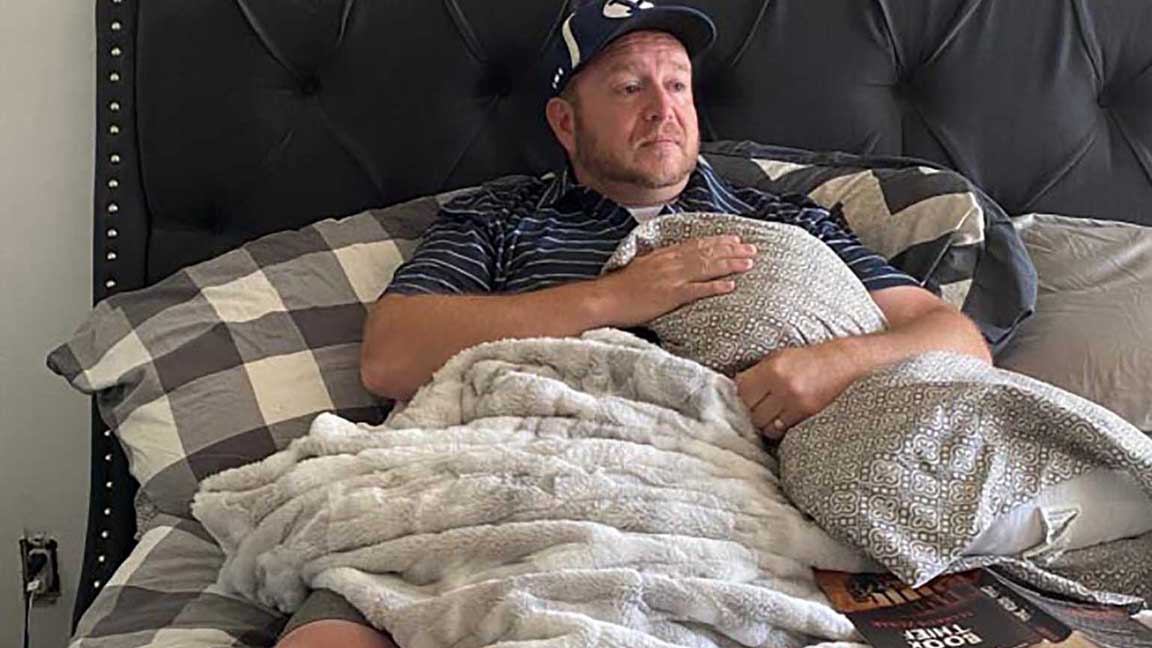
GREG YOUNG STOOD over a body bag containing his 46-year-old friend, a victim of COVID-19. It was July 9. Two Labrador retrievers behind the front gate of the man’s home cried as their owner was wheeled into an ambulance. The memory of that howling, along with the unstoppable wondering what his friend’s last moments were like, followed Young to his home in North Ogden, Utah. There, he hugged his boys goodnight, told his wife he was going to bed early—it was just 9 p.m.—and collapsed into his king-sized bed, where he clutched his pillows and tried to sleep.But a nightmare about death, along with another dream about a woman who wanted Young to buy the Christmas trinkets she was selling—and then cried inconsolably when he refused—kept Young from consistent sleep.
When he got up Friday morning, he donned a baseball cap, barely noticing the dark circles under his eyes.
“Yeah, I’m a little tired,” Young said. “But isn’t everybody right now? I think this whole COVID situation has really made people tired.”
Young, 49, tries to counteract that negative impact by helping people out whenever he can: in his personal life, where he says he is devoutly spiritual, as well as at work, at the offices of the transitional services for the Church of Jesus Christ of Latter-day Saints in Salt Lake City. He is the general manager there, helping to meet the needs of an impoverished population that includes refugees, immigrants and people coming out of incarceration.
But 2020 has repeatedly brought Young to tears, when despite his efforts to intervene, three of his friends have unexpectedly died.
The first friend was a colleague, Gordon Smith.
“He took his last breath in my arms,” Young said.
“There were three missionaries in my office and everyone was joking around about the conspiracy theories surrounding COVID,” Young said.
To support the group’s levity, Young offered to make a donut run. When he returned to the office, he saw his friend “sitting in a chair, with his head tilted back, making gurgling sounds.”
“I started doing CPR and security came and I cradled him in my arms and yelled: ‘ Elder Smith come back!’ And then he took his last breath. I went into my office and sobbed.”
That was in March. Before that, in February, came the death of Justin, a man whose last name is not being used to protect his identity. Justin was a homeless man in his early 30’s whom Young was mentoring.
He had been out in the streets since he was a teenager, Young says.
“He was hooked on drugs,” Young said. “He hustled people for money and he was regularly getting picked up by the cops.”
Sometimes the two sat men in Young’s office, talking about life and all its hardships. “One thing that I have learned is not to judge,” Young said. “Because, yeah, some of my clients have made bad choices. But don’t we all?”
Young tried to coax Justin into detox, but to no avail. One afternoon at work, Young got a call that Justin had overdosed. Police found his body near a downtown building vent, where Justin had apparently huddled in an attempt to be near the warm air that the vent was blowing outside.
Young felt awful. Yet he says he knows in his heart that in death, there is a release of suffering. “Their spirits are soaring and they are probably happy that they aren’t having to deal with the tumultuous life that we live in.”
The third friend who died was Mark Stout, the man who contracted COVID-19 earlier this month. A husband and father of three, Stout was a self-employed truck driver who lived in Harrisville, Utah. Young got the news of Stout’s death the day it happened.
“My bishop called and said: “Greg, there is an ambulance and three cop cars in front of Mark’s house,” he said.
Stout had texted Young just a few days previously: “ ‘I have COVID and I think my family has COVID as well.’
“I texted him back and said: “What can I do to help?’
“There is nothing you can do,” Stout texted back.
Nevertheless, Young sent more texts. Stout didn’t, or couldn’t, respond.
Before the COVID, Stout had told Young that he had several near-death experiences, as he had nearly died in car accidents as well as industrial accidents.
“Greg, I have nine lives,’ ” Young says Stout told him. “‘I don’t understand why I keep staying on this earth. What is my purpose here? I keep getting saved.’ ”
But the medical complications he endured, which include diabetes, left Stout vulnerable to COVID-19.
When Young drove to Stout’s house, the police wouldn’t allow Young to enter the home, where Stout’s wife and two children were quarantined inside, Young says.
“I told the police: ‘I am his friend, can you at least let me wheel him out so I can say my goodbye?’ ”
Standing over his body, Young says he told Stout that he was sorry he couldn’t be with him one last time.
“Don’t get me wrong,” Young says. “There is a lot of good in this world. But every day I see suffering. I see people who have to go through very difficult circumstances and I wish I could rescue them all. But I know I can’t do that. I can’t control things like that.”
“How Did You Sleep Last Night?” is an ongoing series.
